12 Best Floor Plan Creators for 2023 (Free + Paid)
When choosing a floor plan creator there are many things to consider. If you’re a beginner then you’ll want software that’s easy to use with an intuitive interface. On the other hand, if you’re a professional you’ll most likely want CAD (computer-aided design) software with fully integrated BIM (building information modelling) workflows.
With so many options available we thought we’d take a look at the best floor plan creators on the market. We’re going to take a detailed look at what they’ve got to offer and what they’re lacking.
We’re also going to see which are the most affordable options and which ones are available for free. So, let’s see how each floor plan creator fares below.
Floor Plan Creators Explained
Floor plans are designs or drawings created by design professionals. They’re used to showcase the aerial view of each floor in a building.
Interior designers can create detailed floor plans with precise physical dimensions that also show the locations of ancillary objects like gardens, open spaces, and more.
A floor plan usually highlights the dimensions and sites of things like windows, doors, and electrical equipment that the building owner wants to include. Most designers now use floor planning software to create accurate floor plans.
A floor plan creator uses lots of different functionalities and tech to build 3D floor plans that are simple and easy to understand. Architects and interior designers can easily access pre-existing templates which means that creating floor plans takes a lot less time than it used to.
2D And 3D Floor Plans
Most initial floor plans are created in 2D to give a graphic representation of what the completed building will look like. They can be as simple or complex as the designer wants them to be.
Floor plans used to be manually designed on paper but in the modern day, designers use floor plan software instead. Modern designers use floor plan software to create rough ideas at first and can then create 3D mock-ups of the interiors of buildings.
Both the 3D and 2D designs are then shown to clients to give them detailed examples of how their building will look, which can then be approved.
12 Best Floor Plan Creators (2022)
1) Planner 5D
Planner 5D is probably the best floor plan creator currently on the market thanks to its great features, affordability, and accessibility.
It can be used in any web browser but it can also be used as a native app on MacOS, iOS, Android, and Windows. This makes it incredibly user-friendly and you can conveniently access your designs wherever you are.
In all platforms, Planner 5D allows you to start from scratch or to use floor plan templates. You also have access to the innovative ‘Capture Your Room’ feature which allows you to create visual representations of building interiors using the camera on your phone. You can also use Planner 5D to create both 2D and 3D floor plans.
This floor plan software is ideal for both beginners and professional designers. It has an extensive catalogue with many categories such as kids’ rooms, kitchens, offices, living rooms, swimming pools, and patios.
The basic version is free and the premium version costs $5.70 (£5.00) a month which is billed annually at $69.00 (£59.99). The commercial version costs twice as much at $11.50 (£10.00) a month and is also billed annually at $136.00 (£119.99) a year.
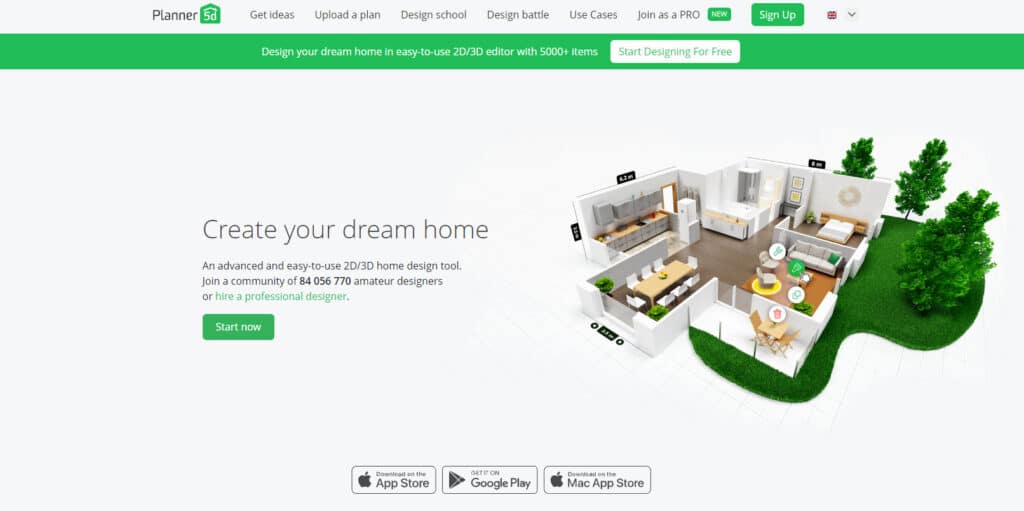
2) Foyr Neo
This floor planning software can be used to draw floor plans from scratch. Designers can also upload existing floor plans and build on them.
It allows designers to use end-to-end design workflow and has many different options for creating and showcasing designs. This makes it a great choice for both rookies and professionals alike.
Foyr Neo has lots of great features that aren’t usually available in floor planner software within this price range. It also allows you to use Google Calendar to arrange a call with a tutor who will show you how to use the software to its full capabilities.
Foyr Neo prices start at $49 (£43) a month but you can try their 14-day free trial first to see if it’s the right fit for you.
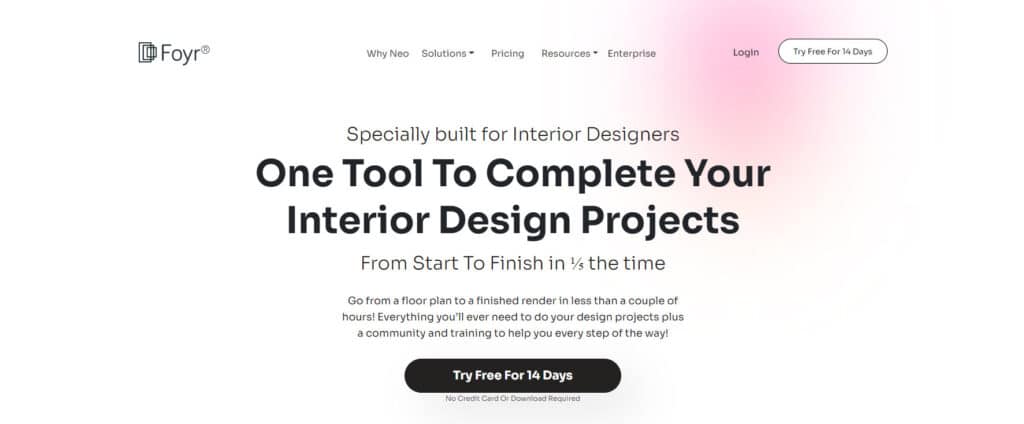
3) Vectorworks
Vectorworks is 2D and 3D, BIM, and CAD floor plan software which can be used on Mac and Windows platforms. This is really fast software with plenty of tools for converting 2D to 3D, converting floor plans, and building designs in both 2D and 3D.
Using a fully integrated BIM workflow, designers can sketch models and it’s perfect for landscape designing, creating floor plans, and industrial planning.
It’s very popular amongst professional designers and architects but it’s not great for rookies without a technical education in BIM or architecture.
Due to the fully integrated BIM workflows, Vectorworks is expensive. It starts at $198 (£123) a month and there are no free trials. However, the high price is worth it for professionals and there is 2GB of cloud storage included in the subscription fee.
4) Roomle
Roomle floor plan software is ideal for homeowners and office managers. It’s used to create floor plans that include furnishings and décor to help clients visualize a space. It can also be used to customize and modify objects and spaces.
If you’re looking for free floor plan software then Roomle’s basic version is for you, as it is completely free. For professionals, the Business version starts at $176 (£153) a month and a free trial is available.
Roomle is easy to use and is ideal for both experts and first-timers. It also allows you to create and export floor plans to other software in a PDF format. For those designing products and furniture Roomle has many tools and features that you’ll find useful.
You can upload your product files and use the built-in visual configurator to configure them. This is a handy feature that combines functions which is helpful for rookies as well as professionals.
This floor plan software is best for designers who want a photorealistic product experience due to its huge amount of customization features. However, it’s not ideal for teams as there are few collaboration opportunities.
5) Smartdraw
Smartdraw is primarily software used for making org charts but it also has an online floor plan creator tool. This tool is easy to use and is ideal for collaborating and sharing designs.
Anyone can use the software to draw floor plans online and create visual representations of building interiors. It also has file-sharing programs and architectural design symbols.
If you’re looking for floor plan software that can create floor plans quickly and easily then Smartdraw will be a good choice for you.
If you prefer software with a more engaging and intuitive interface and lots of features, then this is probably not the best option. It also doesn’t include a 3D design feature.
Once you’ve drawn up your floor plans you can download them in PDF, SVG, or PNG formats. However, if you want a more technical design and architecture software features you should look elsewhere.
SmartDraw prices start at just $9.95 (£8.60) a month and there is a free trial available. Considering the collaboration opportunities that the software provides this is a very reasonable price.
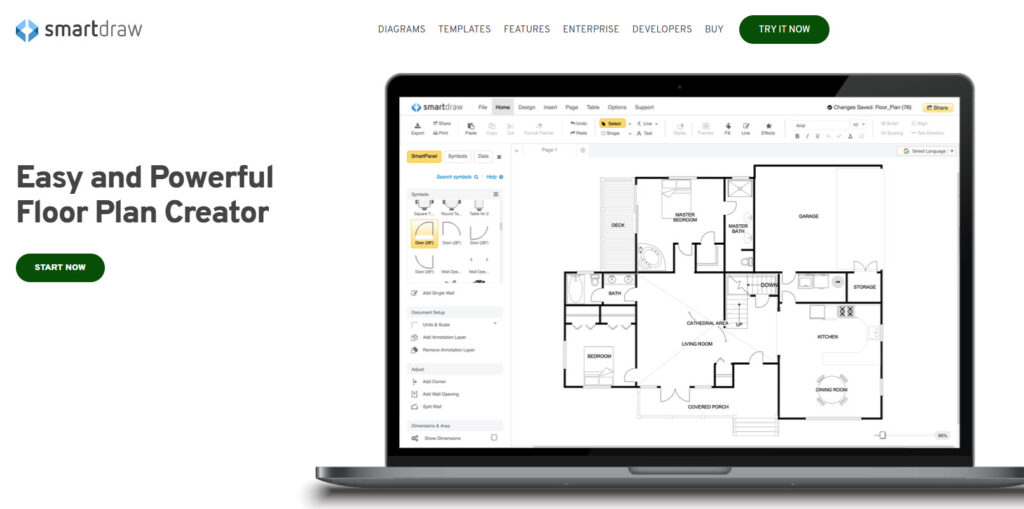
6) Roomsketcher
Roomsketcher is compatible with all Google devices and the GLM floor plan app. It’s particularly popular amongst real estate agents who want to create accurate floor plans and show them to their clients.
It’s fairly straightforward to use and allows you to create detailed 3D designs and walkthroughs that highlight all of the features of a property. If you’re not planning to create an original floor plan then you can upload blueprints to the software and Roomsketcher’s expert illustrator will draw it.
If you’re happy to use the basic version of Roomsketcher then it’s free. However, in order to create 3D designs you’ll need to pay $49 (£43) a month.
This is some of the best floor plan software available for those on a tight budget as the free version allows you to create detailed 2D designs. However, high-end designers and boutiques will most likely need to find software with better rendering capabilities.
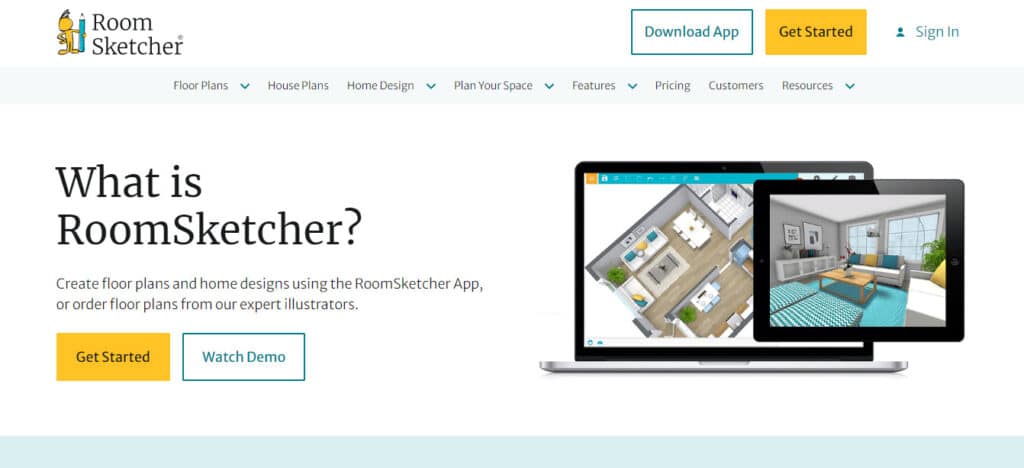
7) Planningwiz
Planningwiz is ideal for real estate agents, interior designers, furniture retailers, and property builders. It can be used to create floor plans in both 2D and 3D.
It’s designed to be easy to use and caters mainly to beginners and small-sized interior designer firms and boutiques. If you’re not familiar with BIM concepts and technologies then Planningwiz may be right for you.
It has a simple interface which makes it ideal for designers and homeowners who don’t have experience with CAD software.
There is a free version that allows you to make 2D and 3D floor plans but it does have some restrictions. Depending on the type of project you might be unable to export or print your designs.
The price of the full version isn’t given on the company’s website so you need to contact them directly if you’re interested.
This floor planning software is great for beginners who just want to make floor plans, convert them into 3D, and then share them. The advanced tools included in the full version are more suitable for professionals.
8) SketchUp
SketchUp has a low learning curve and is a great option for teams that need floor plan software with intuitive modelling. The main feature of the software is template usage which allows you to draft your ideas from start to finish.
Its drawing tool allows you to be very creative and is ideal for RFIs (requests for information), design ideas, and documentation. It’s relatively expensive at $119 (£103) a month but its floor plan software is available for collaborative work.
You can augment your final designs using some of its many innovative features and it’s compatible with laser tools such as Hersch LEM, Hilti PD, Leica Disto, and MAC PD-I.
It’s often used by real estate agents to create quick overviews of properties which they can then show to their clients. Its creative tools allow you to customise complex designs to fit your needs.
9) FloorPlanner
FloorPlanner can be used by homeowners and design enthusiasts with no knowledge of CAD and also by professional designers.
Its features include cloud synchronization, a symbol library, the ability to switch between metric and imperial units, and the option to upload or create new furniture.
In terms of pricing, FloorPlanner is available in different tiers. The basic version gives you a one-floor plan but you need to pay $4.99 (£4.00) a month to be able to create other projects.
The prices for its annual package range from $2.99 (£2.60) to $14.99 (£13) depending on the type of package you choose, and there are free trials available. It’s a favourite for beginners due to its affordable pricing and intuitive interface.
The pro features may be fairly limited but creating new designs is quick and easy. FloorPlanner is good value for money but it lacks some of the complex features of the other programs on our list.
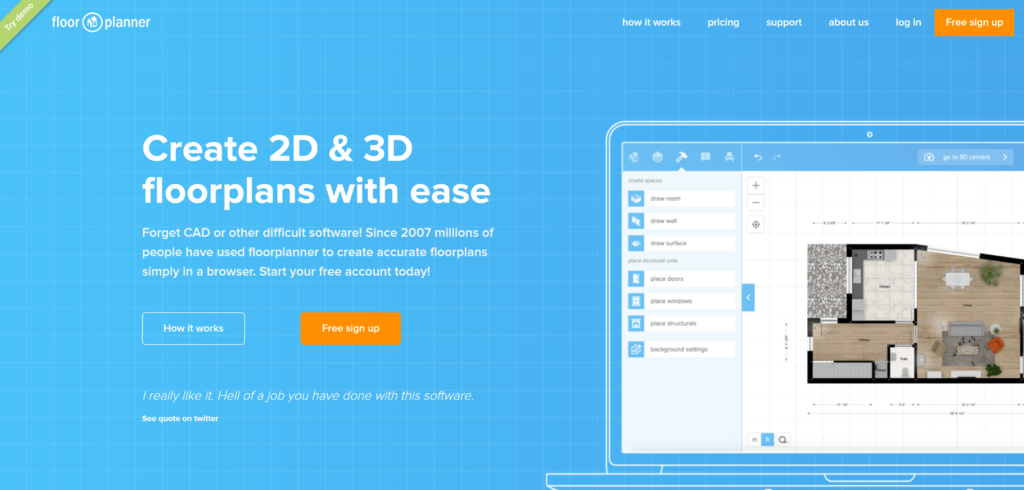
10) LucidChart
If you’re looking for a floor plan creator that’s built specifically for collaboration then LucidChart would be an excellent choice. You can make fairly detailed designs and then share them with colleagues and clients easily.
For architects and designers with lots of BIM and CAD knowledge, LucidChart may be a bit too basic. It’s a fairly elementary tool that is more suited to beginners than professionals.
It’s not the best floor plan creator for integrations and functionalities but it’s great for collaborative projects. As well as floor plans it can also be used for making charts, documents and visual aids.
LucidChart starts at $7.95 (£6.99) a month making it very affordable. However, the low price reflects the fairly limited functionality of the software.
11) Sweet Home 3D
Sweet Home 3D is an easy-to-use CAD program that won’t break the bank. It’s designed for rookies looking for an inexpensive CAD program that can be used to design floor plans at home.
It allows you to create 2D floor plans as well as 3D previews. It’s also used to design and finalize structure blueprints and understand their placements through the use of other accessories.
There are free trials available and the full version costs $14.99 (£13.00) a month. This makes it affordable but it’s not a great choice for professional architects and designers. However, beginners will find it easy to learn how to use it.
Sweet Home 3D is also an open-source option which is quite rare.
12) Homestyler
Homestyler is a browser-based floor plan creator that allows you to design floor plans online. It features documentation and annotation functionality for interior spaces which sets it apart from other online floor plan creators.
Realistic renders can be drawn due to the software’s large database which includes doors, windows, walls, and furniture.
It’s very user-friendly and popular amongst first-timers, and it’s also available on several platforms. However, BIM experts and architects would probably not find it to be comprehensive enough for their needs as although it allows you to translate 2D designs into 3D designs, it doesn’t allow you to create 3D renders or models.
Homestyler includes a symbol library, a furniture library, and dimension lines that are designed by the user and can be reused.
There’s a free trial available and the full version starts at $19.90 (£17.30) a month.
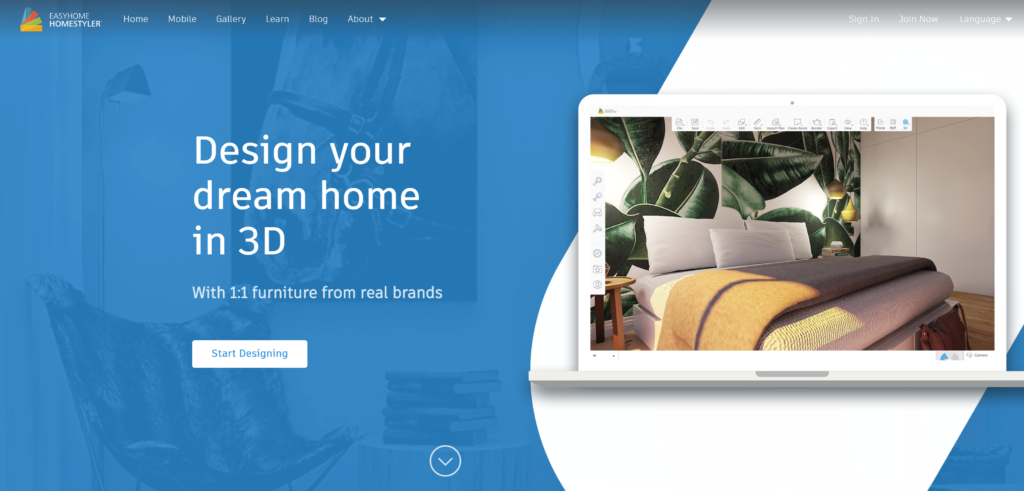
FAQs
What’s included in a floor plan?
Floor plans usually include key levels and dimensions as well as hatching, symbols, and standard abbreviations and annotations which indicate appliances, fittings and materials. Floor plans are usually drawn at scales between 1:200 and 1:20.
What are the different types of floor plan?
There are three different types of floor plan. These are traditional plans, contemporary plans, and custom plans. Traditional plans usually include more walls whereas contemporary plans tend to be more spacious and open. A custom plan could be any type of design.
Why are scales used for floor plans?
Scales are used in floor plans to give the designer an understanding of the relationships between a visual representation and reality. Spatial design and architectural drawing require designers to be able to switch between scales and draw to scale accurately.
It’s one of the most important skills that architects and designers must have.





